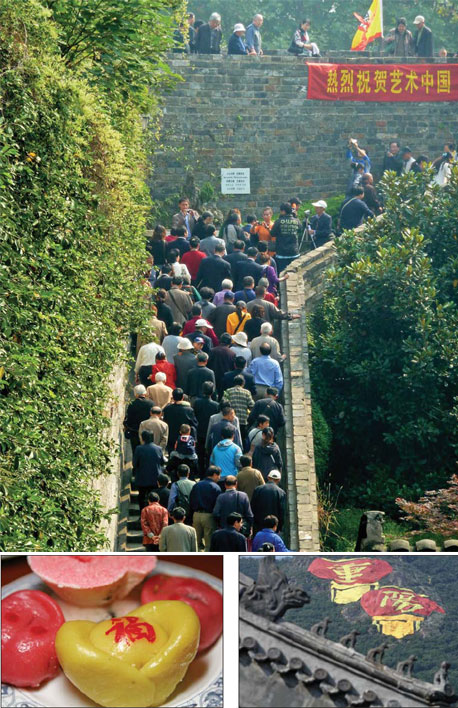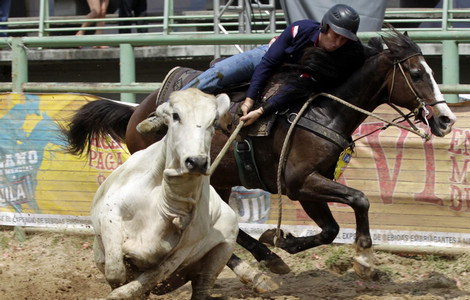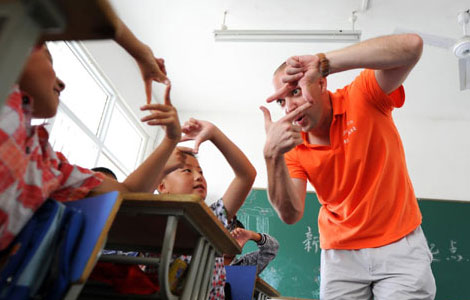Double take
Updated: 2012-10-19 07:50
By Zhang Lei (China Daily)
|
||||||||
|
Top and above left: Climbing mountains and eating Chongyang cakes are activities to celebrate Double Ninth Festival. Above right: Chinese characters chong and yang displayed in huge sizes on the mountaintop of Beijing Badachu Park to observe the festival. Photos provided to China Daily |
Traditional Chinese festival a time for healthy living and remembering the elderly
More than a decade ago, Eunice Moe Brock packed her bags and sold all her property in the United States. She ended up on the other side of the world - in one of the poorest villages in Yanggu county, Shandong province.
Unsurprisingly, her move caused a stir among the villagers. But her kindness soon won the love and respect of Yanggu's residents.
Later this month, the 95-year-old Brock will make a trip back to the country, bringing gifts for its senior residents and watching performances together with them, similar to what she has done for the past eight years.
The treats are part of the celebrations to mark Double Ninth or Chongyang Festival, a traditional Chinese holiday to carry out healthy activities and remember the elderly.
The festival falls on Oct 23 this year.
During ancient times, the Chinese theory of yin and yang was developed to explain natural phenomenon via two opposing principles. Yin stood for the feminine, negative side, while yang reflected the masculine and positive.
The ancient Book of Changes treatise identified nine as the "biggest" yang number. Odd numbers belong to yang, while even numbers fall under yin.
Double Ninth falls on the ninth day of the ninth month in the Chinese calendar, making it a day when the yang number is doubled. Chongyang also means a "double yang".
This special yang time has also become a time for Chinese people to get together and carry out activities that help them "deal" with the day's unique nature, including climbing mountains and viewing chrysanthemums.
Chinese people historically believed that climbing a mountain - the higher the better - on this day protected them against evil spirits and danger. Since the festival usually falls during the harvest season, various sightseeing spots are often at their best.
Chinese families gather to appreciate the beauty of blooming chrysanthemums during Chongyang. Unlike the Western world which relates the flower with death, the Chinese regard it as a flower of longevity.
People who happen to live in less mountainous areas can also eat Chongyang cakes as a substitute for these activities - the Chinese word for cake or gao sounds like "high", and the treats are eaten with chrysanthemum wine.
Another important ritual of Chongyang includes wearing a few twigs of dogwood, a custom that points to the origins of the festival.
One of the legends recorded in the book Xu Qi Xie Ji, written by Wu Jun in the 6th century, says that during the Eastern Han Dynasty (AD 25-220), a demon around Ruhe River terrorized local residents. A young man named Huanjing whose parents were killed by the demon left his wife and children to find ways to defeat the monster. Huanjing was finally accepted as a disciple of Fei Changfang, a Taoist immortal who lived on a mountaintop in the east.
For years, Huanjing learned the arts of fighting evil and monsters. One day, his teacher told him that his demon nemesis was due to appear the next day. The immortal advised Huanjing to return home and face it.
Huanjing rode on the back of a crane and brought along a bag of dogwood, a beaker of chrysanthemum wine and a magic sword.
He led his fellow residents to a nearby mountaintop, giving them each a piece of dogwood tied to their arms and a cup of the wine.
When the demon appeared, it found itself subdued by the strong fragrance of the dogwood and the wine. Huanjing killed it with the magic sword.
Many Chinese continue to believe that mountain hiking is one way to ward off evil and sickness.
Dogwood, with its strong fragrance, was later used as a Chinese herbal medicine to drive away chills in the body.
In the late 1980s, the festival began to emphasize respect for the elderly - its "double yang" can also be read as longevity and good health for the old. The authorities subsequently designated it as Elderly Day in China.
But Zheng Zelin, a researcher at Beijing Traditional Folk Art Association, offers a different take.
"I think it reflects more on the sad fact that nowadays the tradition of filial piety and respect for the elderly has been greatly neglected," he says.
Back in Shandong's Yanggu county, these values are still being kept alive by people such as Brock.
Of the countless number of charity events she has taken part in over the past 12 years in China, Brock is most proud of one act she did in 2001 for 130 elderly villagers - she bought them each a pair of glasses and provided financial support for five of them to undergo surgeries to treat their cataracts.
In August 2006 the China Charity Federation honored the American with a "Philanthropy Ambassador of China" award for her work. The blessings she gives and receives continue to inspire many others who want to make a difference to the lives of the elderly.
zhanglei1@chinadaily.com.cn
(China Daily 10/19/2012 page18)












